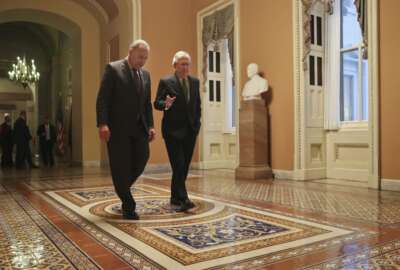
Using OCO funds to bypass budget caps ‘departure from historical norms,’ CBO says
The Congressional Budget Office said current use of overseas contingency operations (OCO) funds to pay for enduring costs can distort the DoD's long-term budget...
Spring is just around the corner, that time when a legislator’s fancy turns to sequestration. The Bipartisan Budget Act of 2018 increased the debt limit through March 1, 2019, so lawmakers will need to act soon to raise the debt ceiling again, or cut discretionary spending to avoid across the board budget cuts. But questions persist with members of the Senate Budget Committee about whether enduring costs in overseas contingency operations (OCO) funds should be used as a backdoor for avoiding the cap on the defense budget.
These questions are especially relevant considering recent reports of administration plans to dump tens of billions of dollars into OCO funding to achieve its desired increases to the defense budget, while allowing non-defense spending to remain subject to the spending caps. According to a 2018 Congressional Budget Office report, if the budget caps are not raised, the automatic procedures will reduce the budget by $90 billion, or 7.4 percent.
Sen. Tim Kaine (D-Va.) pointed out during a Feb. 27 Budget committee hearing that OCO accounts for 73 percent of budget cap adjustments since 2013, and that it’s added 14 percent to Defense Department funding since 2012. But the fund is meant for short-term wartime contingencies, not enduring costs.
Yet Kaine said, quoting from written testimony, that about $50 billion in OCO money each year has gone to enduring costs, including items from the base budget. That accounts for 60 percent of OCO spending since the Budget Control Act was passed in 2011, establishing these spending caps.
“What this means to me is we’re overusing OCO, and using OCO contrary to historic norms probably just as a way of getting around the BCA budget caps,” Kaine said.
Related Stories
Sen. Chris Van Hollen (D-Md.) was more direct, calling OCO a slush fund. He quoted from a 2015 House report, where Paul Ryan, then-chairmen of the House Budget committee, called OCO a “backdoor loophole that undermines the integrity of the budget process.”
Both senators asked witnesses from the CBO to weigh in on how OCO has been used in recent years.
“I can’t comment about the appropriate or inappropriate use of OCO, but I will say what we are doing since 9/11 is a significant departure from historical norms,” David Mosher, assistant director for National Security at the Congressional Budget Office told the committee. “In the Korean War, for example, OCO accounted for more than half of the base budget for the first year, but in the second year, the base budget rose to that level and even higher.”
Mosher said funding higher priority programs like base maintenance through OCO in this way can also distort the DoD’s longer-term budget planning. If these items aren’t included in the DoD base budget, then they also won’t be included when DoD puts together its five year plan. This can lead to lower priority, more expensive or less-than-optimal solutions getting funded that wouldn’t ordinarily.
Mosher pointed out that last year, then-Office of Management and Budget Director Mick Mulvaney proposed to begin folding enduring costs in the OCO funds back into the DoD base budget over the next few years, culminating with the 2023 budget. That process began in 2019, so the use of OCO to bypass budget caps in defense spending would also be a departure from this administration’s policy.
Mosher also pointed out that while OCO funds do not apply towards the budget caps, if they are exceeded and sequestration is triggered, OCO would also be subject to the indiscriminatory, across-the-board cuts.
Waste, fraud and abuse
Sen. John Kennedy (R-La.) also brought up one of Congress’ greatest hits when it comes to reducing the budget: Waste, fraud and abuse. He said improper payments, such as Social Security payments to dead people, constitute $144 billion per year.
But Teri Gullo, assistant director for Budget Analysis at CBO, said most issues of waste, fraud and abuse stem from administrative errors such as improperly filled-out paperwork, and that it doesn’t constitute a large part of most organizations’ budgets, and isn’t necessarily the best way to save money.
“While you might be able to get to a point of having fewer improper payments, for example, that could come at a very steep price,” Gullo said. “Even if you solved those problems, it’s not clear that you’re going to reduce the deficit or save that much money.”
Copyright © 2024 Federal News Network. All rights reserved. This website is not intended for users located within the European Economic Area.
Daisy Thornton is Federal News Network’s digital managing editor. In addition to her editing responsibilities, she covers federal management, workforce and technology issues. She is also the commentary editor; email her your letters to the editor and pitches for contributed bylines.
Follow @dthorntonWFED





